Quick actions
Stay organised
Bookmark tricky proofs or add doubts to your dashboard so they resurface before exams.
Open dashboard →NCERT Solutions for Class 10 Maths Chapter 2 – Polynomials
Master "Polynomials" with step-by-step NCERT solutions.
Exercise 2.2
Question 1
Find the zeroes of the following quadratic polynomials and verify the relationship between the zeroes and the coefficients.(i) x2–2x –8
(ii) 4s2–4s+1
(iii) 6x2–3–7x
(iv) 4u2+8u
(v) t2–15
(vi) 3x2–x–4
Answer
(i) x2–2x –8
⇒x2– 4x+2x–8
= x(x–4)+2(x–4)
= (x-4)(x+2)
here zeroes of polynomial equation
x-4 =0
x=4
x+2=0
x=-2
verification:
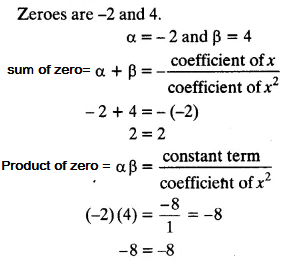
hence verify
(ii) 4s2–4s+1
Answer
⇒4s2–2s–2s+1
= 2s(2s–1)–1(2s-1)
= (2s–1)(2s–1)
Therefore, zeroes of polynomial equation
2s-1= 0
s=1/2
2s-1 =0
s=1/2
verification:
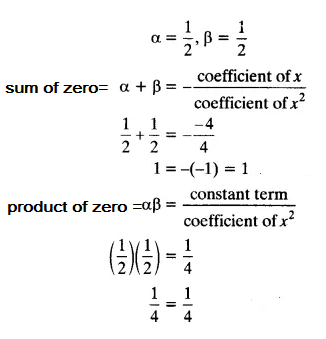
hence verify
(iii) 6x2–3–7x
Answer
⇒6x2–7x–3
= 6x2 – 9x + 2x – 3 = 3x(2x – 3) +1(2x – 3)
= (3x+1)(2x-3)
Here , zeroes of polynomial equation
2x-3=0
x= -1/3
2x-3=0
s= 3/2
verification:

 =
= 
=
hence verify
(iv) 4u2+8u
Answer
⇒ 4u(u+2)
Here zeroes of polynomial equation
4u=0
u=0
u+2=0
u= -2.
verification:
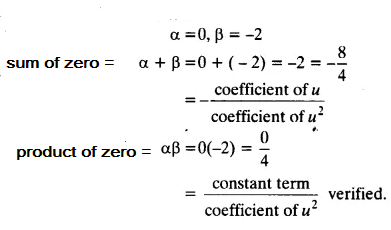
hence verify
(v) t2–15
Answer
⇒ t2 = 15 or t = ±√15
verification:
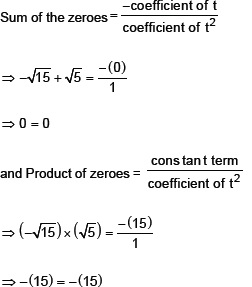
hence verify
here , zeroes of polynomial are (√15, -√15)
(vi) 3x2–x–4
⇒ 3x2–4x+3x–4
= x(3x-4)+1(3x-4)
= (3x – 4)(x + 1)
Therefore, zeroes of polynomial equation 3x-4 =0
x=4/3
x+ 1=0
x= -1)
verification:

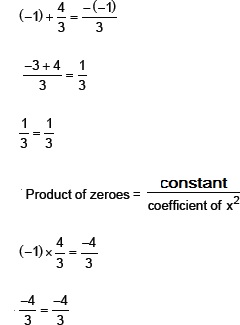
hence verify
Question 2
Find a quadratic polynomial each with the given numbers as the sum and product of its zeroes respectively.(i) 1/4 , -1
(ii)√2, 1/3
(iii) 0, √5
(iv) 1, 1
(v) -1/4, 1/4
(vi) 4, 1
Answer
(i) 1/4 , -1
From the formulas of sum and product of zeroes, we know,
Sum of zeroes = α+β = 1/4
Product of zeroes = α β = -1
We know thatx2–(α+β)x +αβ = 0
x2–(1/4)x +(-1) = 0
4x2–x-4 = 0
Thus,4x2–x–4
(ii)√2, 1/3
Answer
Sum of zeroes = α + β =√2
Product of zeroes = α β = 1/3
We know thatx2–(α+β)x +αβ = 0
x2 –(√2)x + (1/3) = 0
3x2-3√2x+1 = 0
Thus, 3x2-3√2x+1
(iii) 0, √5
Answer
Sum of zeroes = α+β = 0
Product of zeroes = α β = √5
x2–(α+β)x +αβ = 0
x2–(0)x +√5= 0
Thus, x2+ √5 is the quadratic polynomial.
(iv) 1, 1
Answer
Given,
Sum of zeroes = α+β = 1
Product of zeroes = α β = 1
x2–(α+β)x +αβ = 0
x2–x+1 = 0
Thus , x2–x+1
(v) -1/4, 1/4
Answer
Given,
Sum of zeroes = α+β = -1/4
Product of zeroes = α β = 1/4
x2–(α+β)x +αβ = 0
x2–(-1/4)x +(1/4) = 0
>4x2+x+1 = 0
Thus,4x2+x+1
(vi) 4, 1
Answer
Given,
Sum of zeroes = α+β =
Product of zeroes = αβ = 1
x2–(α+β)x+αβ = 0
x2–4x+1 = 0
Thus, x2–4x+1
Chapter shortcuts
- Chapter 1 · Real Numbers
- Chapter 2 · Polynomials
- Chapter 3 · Pair of Linear Equations in Two Variables
- Chapter 4 · Quadratic Equations
- Chapter 5 · Arithmetic Progressions
- Chapter 6 · Triangles
- Chapter 7 · Coordinate Geometry
- Chapter 8 · Introduction to Trigonometry
- Chapter 9 · Some Applications of Trigonometry
- Chapter 10 · Circles
- Chapter 11 · Constructions
- Chapter 12 · Area Related to Circles
- Chapter 13 · Surface Areas and Volumes
- Chapter 14 · Statistics
- Chapter 15 · Probability